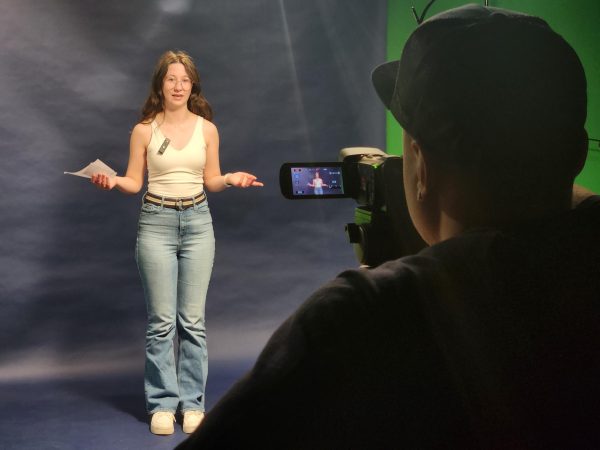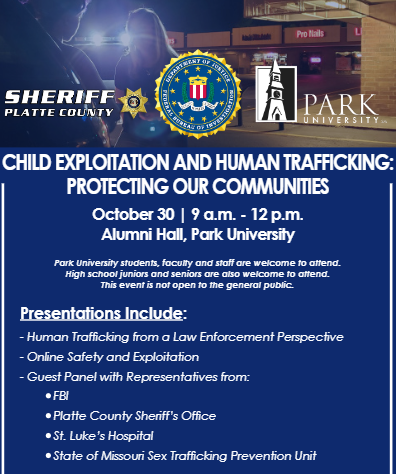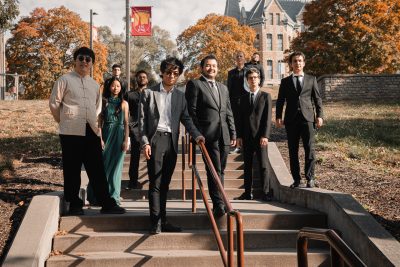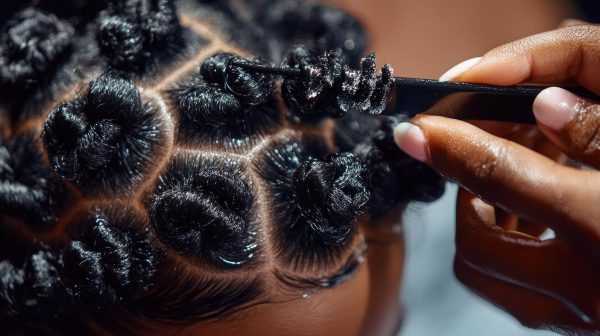Arts educator leads discussion at poetry event
In the first week of black history month and the second half of Park’s Year of Diversity, the school welcomed poet, arts educator and peanut butter enthusiast Kavindu “Kavi” Ade. Ade spent two nights performing and workshopping with attendees, exploring different types of art and their ability to invoke social change.
“I’m queer, and I’m trans, and I’m black. I’m also a first generation American,” said Ade, appearing from backstage to take the podium. Ade’s Bajan mother is a Jehovah’s witness and their father, from Trinidad, practices Santeria.
“You’re going to learn a lot about me tonight,” laughed Ade, explaining the many elements that shaped their world view and the resulting poetry. For the past eight years, Ade has worked with 13- to19-year-olds as a performance coach, guiding teams of teens to events such as the Brave New Voice festival.
“We were on our way back from just winning this regional slam, and it was the night the Zimmerman verdict was announced. So I wrote this poem about that,” said Ade, before launching into the first poem of the night. Mid-sentence shifts from jovial to heartbroken seem to be a signature of Ade’s writing and illustrate the importance of vulnerability in their work.
“To create, you have to be vulnerable in some capacity,” says Ade. This idea was reinforced in the workshop on the second night of the event. After watching some performances from 2015’s Brave New Voice finalists, attendees participated in an exercise those same finalists had employed. In a circle, with closed eyes, everyone contemplated the most vulnerable thought they had that day. At Ade’s prompting, individuals approached a board and wrote the thought anonymously.
“No one knows who wrote what, and I don’t look at the board when I do it,” says Ade. “Then everyone opens their eyes and reads the board, and it’s all these different thoughts that people have had throughout the day. It’s always interesting how other people can connect with something someone else wrote. Sometimes we feel so isolated and alone in our thinking around certain things, and then there’s someone else who completely understands where you’re coming from,” Ade explained about the exercise.
One of the event’s planners, sophomore psychology major Ghislaine Fumey, elaborated on the purpose of the second night’s workshop.
“The biggest thing I wanted to do the workshop for was to have more of a hands on thing instead of just people being up there and spewing,” says Fumey. “Get into it, actually do it for yourself and see what it’s about,” she adds.
“It doesn’t have to be the most poetic thing as long as it’s their words. Some people free write, some people write essays honestly. It’s just to get people writing and talking about how they feel about the world,” added Ade. Ade makes an adamant point that the substance of expression is much more important than the resulting art’s quality.
“When I was younger I did a lot of those things – a lot of protesting, organizing, planning marches – and I got to a point where I realized that everyone’s activism doesn’t have to look the same,” says Ade. “We’ve kind of bought into this collective notion that this is what activism looks like. I think it can be really detrimental because after a while the protest starts to take a toll on your mental health. It’s like living this loop. I’m not devaluing people who still participate in that form of protest but I know, for me, it got to a point where it was hurtful more than it was helpful. My art is activism because I am having difficult conversations, showing up, being visible and calling out systems of oppression, but through art.”
Ade sees art invoking social change across decades and mediums, pointing first to modern singers like Janelle Monae and Kendrick Lamar.
“He [Lamar] had a song called ‘Alright.’ Just looking at how it lent itself to the movement for black lives and protests where people in the streets are chanting ‘Alright’ because it’s such an uplifting song that helps people know they’ll make it through this,’” says Ade. “I feel like people don’t necessarily connect those two things as a social justice piece of art, but it became one.”
Weaving between past and present, amid poets and painters, Ade sees parallels and relevance everywhere. Ade compares Baltimore-based Devin Allen with civil rights and apartheid-era photographers.
“These were images that galvanized generations. Art is so far reaching in different ways. There’s such a breadth of art that can really speak to people and inspire them. It still matters,” says Ade.
In an interesting intersection of ideas, Ade’s ability to travel and perform workshops such as this was made possible by their own openness to feeling vulnerable. Last year, Ade stepped down from a position with a nonprofit organization in order to pursue the life of a traveling poet.
“I pretty much travel the country and go to different colleges and universities, conferences and perform and speak on panels,” says Ade. “I do Q & As, teach workshops; I’m actually going to have my first show outside the U.S. in March, in Peterborough, Canada.”
“It’s really fulfilling and I meet incredible student leaders and people with really powerful voices,” they add. Despite this base of support, there are still many places Ade doesn’t feel welcome. In another example of being open to vulnerability, however, they’re often places they feel needed most.
“I think that there definitely are queer and trans spaces that specifically cater to white people, and they don’t necessarily know how to engage with people of color,” says Ade. “The way that manifests is that in those spaces, I experience microaggressions and racism, and they cant even realize that they’re perpetuating those things because they feel like, as part of an oppressed identity group, they can’t be harmful, while being harmful.”
Ade has also felt alienation in the black community, recalling an unwelcoming reception when speaking at an MLK day panel in Philadelphia.
“I was so nervous to have to speak here tonight because I didn’t know who was going to deny me my humanity,” Ade recalls saying. “It’s ridiculous because we show up for y’all. In some ways, with these multiple oppressions it’s because we have less to lose; we’re already at the bottom. It’s not fair to us that you don’t show up. It’s not fair that when a black trans woman is murdered, you’re not at that rally.”
These issues highlight the importance of Ade’s work, and that of anyone else involved in the same fight.
“This event is to educate,” says Fumey. “You can’t really solve a problem without knowing the history of the problem. This is the first of many steps. The year of diversity is a continuation of the year of inclusion. We’ve included people, now, how do we make that space diverse?”
Your donation will support the student journalists of Park University. Your contribution will allow us to cover our annual website hosting costs, freeing up other funds for equipment, printing and training.







